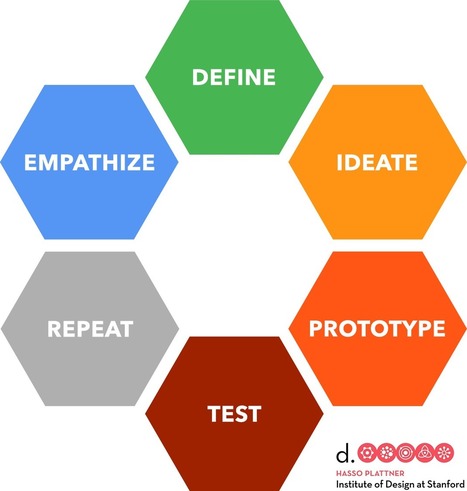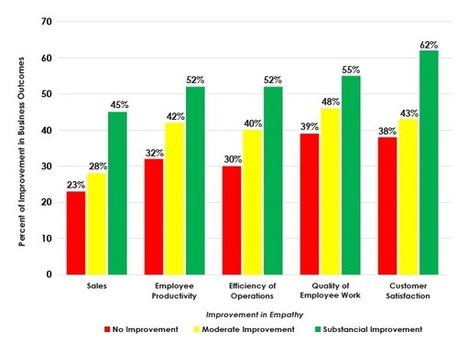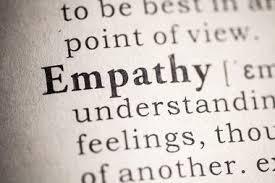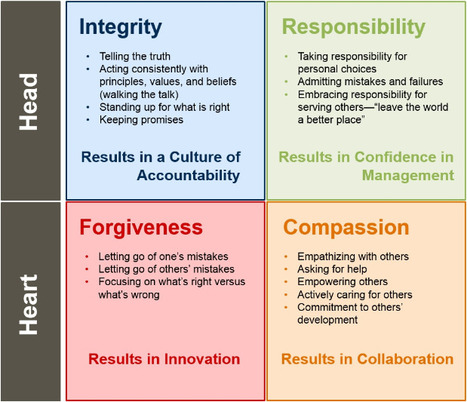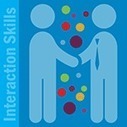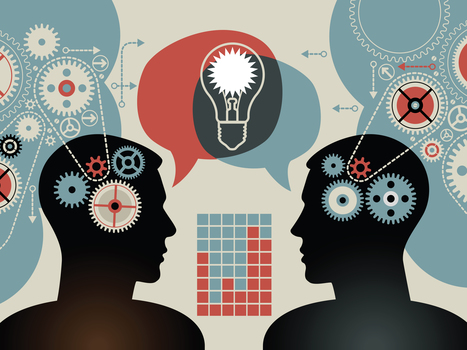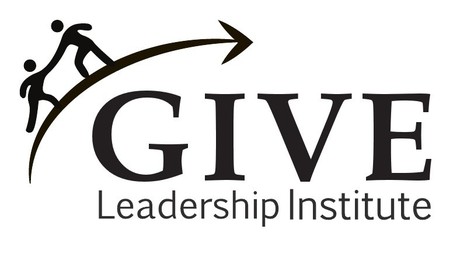 Your new post is loading...
 Your new post is loading...
What is Design Thinking? Design thinking is an empathy based, creative problem solving process embraced by innovators around the world for addressing complex problems. At its heart, it nurtures the ability to see a situation from someone else's point of view, engineer a solution, and then test and refine your solution based on feedback. It is one approach CSI students will use to master the California Common Core State Standards and build the adaptable thinking skills they will need for success in the 21st century workforce.
Via John Evans
Empathy can make or break relationships. It is a skill, which can reap many benefits in both your personal life and work place. These 5 simple habits will help you to grow your empathy muscle.
The DDI report reveals a dire need for leaders with the skill of empathy. Only four out of 10 frontline leaders assessed in their massive study were proficient or strong on empathy.
Richard S. Wellins, senior vice president of DDI and one of the authors of the High-Resolution Leadership report, had this to say in a Forbes interview a year ago:
We feel [empathy] is in serious decline. More concerning, a study of college students by University of Michigan researchers showed a 34 percent to 48 percent decline in empathic skills over an eight-year period. These students are our future leaders!
We feel there are two reasons that account for this decline. Organizations have heaped more and more on the plates of leaders, forcing them to limit face-to-face conversations. Again, DDI research revealed that leaders spend more time managing than they do "interacting." They wish they could double their time spent interacting with others. The second reason falls squarely on the shoulders of technology, especially mobile smart devices. These devices have become the de rigueur for human interactions. Sherry Turkle, in her book, Reclaiming Conversation, calls them "sips of conversations."
Via David Hain
In the world of business, empathy is a hot topic. Articles on empathy have appeared in the Harvard Business Review, The Wall Street Journal, Huffington Post, Time, and many other outlets. Empathy has also proven to be a popular theme of recent commencement addresses—last spring’s graduates of the University of Michigan and Howard University, where President Obama did the honors, heard speeches about the importance of empathy.
Why all the interest? In a word: technology. Every job that can be automated is, or will be in the not-too-distant future. As a result, organizations are shifting focus to the jobs and interpersonal skills that machines and software will never replace. A study published in the August 2015 issue of Harvard Business Review reports that, since the 1980s, occupations enjoying the highest job and wage growth are social skill-intensive. Work is becoming more team-based and requires the flexibility and adaptability that computers cannot deliver. Social or “soft” skills are now critical differentiators that distinguish organizations as both employers and competitors.
Empathy, as this article will show, is the most important of these soft skills for effective leadership. Unfortunately, while there is growing recognition of empathy’s importance, many organizations are unsure how, and if, empathy can be developed.
To bring greater clarity about empathy, we offer new research. Specifically, this research addresses the importance of having empathetic leaders, the developability of empathy, and the impact empathetic leaders can have on organizational performance.
Via David Hain
Interpersonal skills are a prerequisite for harnessing outside-the-box thinking on behalf of others, and they’re just as important as math, science and technology training.
For empathy to have lasting impact, companies must understand that it’s not a “soft skill”, but an urgently needed quality, and one that can contribute to commercial potential.
Big ideas are important, but being a good listener is just as critical a skill to develop.
Before starting my Executive Coaching practice I was a Financial Advisor and Coach to my team. In that industry a study was conducted of the most successful Wealth Management Advisors to discover the most important skill possessed by Top Advisors.What did the study reveal?The number one skill is empathetic listening.The ExperimentAn experiment was conducted where advisors watched a video interview of a prospective client couple. After watching, they were then asked to describe the husband from the interview.One advisor said “arrogant,” Another said “defensive.” Another
Via Dan Forbes
The world requires a new paradigm, where empathy is innovation and vulnerability is strength.
Via Maria Rachelle
|
Empathy can be taught and learned--and help us create a more compassionate world.
Via Barbara Kerr, Ei4Change
If this year’s index is anything to go by, that change might already be taking place. Take Ryanair, the budget airline with a somewhat chequered history when it comes to customer service. Last year it finished second from bottom in the index.
Perhaps it was the repeat profit warnings, but the company realized change was needed: low prices weren’t going to be enough to keep customers coming back. So it embarked on what has been described as a Damascene conversion.
Through its Always Getting Better programme, Ryanair set about listening to customer feedback and scrapping the policies people didn’t like – unallocated seating, draconian luggage rules and hidden charges.
The new approach is already paying off: this year Ryanair not only increased net profits, but it climbed 13 places in the Empathy Index. Proof that empathy isn’t just about being a nice guy: it makes good business sense.
You can see the full 2016 Empathy Index here.
Via David Hain
Tensions are running higher than usual these days. In addition to the everyday disagreements we have with our friends, family, and coworkers, the brutal election over the last year appears to have ripped the country in two, with liberals and conservatives unable to see eye to eye. In addition to everyday arguments at the office about which marketing idea was better or how much to spend on a colleague's baby shower, those on opposite sides of the political divide feel anger, resentment, and animosity toward one another. Heated emotions are bubbling to the surface. Spencer Greenberg, founder and CEO of Clearer Thinking, a non-partisan organization that conducts research on decision-making and creates free tools for the public, sees our current state of discord as an opportunity to learn to be more empathetic. He's been developing strategies for helping Clinton and Trump supporters to better relate to one another.
Via The Learning Factor
The election of Barack Obama marked the emergence of the Tea Party, a radical right-wing movement that challenged the Republican establishment and ultimately fueled the rise of Donald Trump.
Where did the Tea Party come from? That’s the question renowned sociologist Arlie Russell Hochschild set out to explore in her new book, Strangers in Their Own Land: Anger and Mourning on the American Right.
She traveled from her home in Berkeley, California—educated, affluent, liberal, and diverse—to one of the poorest, least educated, most conservative, and most racially divided states in America: Louisiana. There she spent five years listening to Tea Party conservatives who later came to support Donald Trump—mainly working-class whites.
Hochschild was a graduate student at the University of California, Berkeley, during the tumultuous period of the 1960s—one that shaped her values, politics, and academic research. Unlike many sociologists—who tend to study how societies are organized—Hochschild has focused on the role of human emotions in shaping relationships and political behavior. She is probably best-known as the author of The Second Shift, a pioneering exploration of the division of labor between men and women at home.
We discussed her research for Strangers in Their Own Land, what it could tell us about how divided America has become—and how we might begin to bridge our differences.
Via David Hain
Successful leadership is defined by a single ingredient: it’s mastering successful conversations. By looking at the relationship between interaction skills and job performance, it’s easy to see why empathy is so important.
“Overwhelmingly, empathy tops the list as the most critical driver of overall performance. It also consistently relates to higher performance in each of the four leadership domains. Download PDF Empathy Still Matters: In Every Way No matter what your favorite definition of leadership is (there are 462 million Google® entries), we believe it’s largely dependent on a single ingredient: mastering successful conversations. By the end of each day, leaders likely have had multiple conversations with a range of their constituents. Each of these interactions will collectively determine their ultimate success as a leader. http://www.ddiworld.com/DDI/media/trend-research/hirezleadership-findings/hirezleadership_is-empathy-boss_finding_ddi.pdf?ext=.pdf ”
Via Edwin Rutsch, Lynnette Van Dyke
Until now, there have been a variety of tools for managers who wish to measure the emotional cues of individuals, such as the Brief Affect Recognition Test to understand cross-cultural facial expressions. Facial expressions provide a wealth of reliable information about how others are making sense of the world around them, and allow us to tailor our responses to the individual in a one-on-one situation. This represents one of the key measures of emotional intelligence, which evaluates how well individuals perceive and deal with affectively charged interpersonal situations.
Read more at http://knowledge.insead.edu/strategy/leaders-who-can-read-collective-emotions-are-more-effective-4002#VsZzWHkFKKeIo3ac.99But there are situations in which leaders have to deal with the emotions of large groups of people, not just those of one or a few individuals and most managers don’t have time to operate on a one-on-one basis all the time. Understanding the collective can help leaders respond effectively to the group as a whole. This happens in situations such as dealing with the collective anxiety of executives facing the news of corporate restructuring; or public authorities dealing with the collective anger of large groups of people in the streets; or politicians seeking to inspire large groups of people to win an election. Those with the skill to pick up on the subtle emotional cues of the collective can adapt accordingly and, according to our research, earn more respect as a result. So how can this ability to see the forest for the trees be applied by leaders?
Learn more: - http://www.scoop.it/t/21st-century-learning-and-teaching/?tag=Empathy - http://www.scoop.it/t/21st-century-learning-and-teaching/?tag=Daniel+Goleman - http://www.scoop.it/t/21st-century-learning-and-teaching/?tag=EQ
Via Mark E. Deschaine, PhD, Gust MEES, ValerieMalaval
If your boss is a jerk, there might be a scientific reason for it. A new study suggests feeling powerful dampens the part of the brain that helps us connect with others.
Via Kenneth Mikkelsen
Studies show that around 80 percent of workers are not passionate about what they do. Here are 3 ways to start changing the status quo.
Via Maya Mathias, AlGonzalezinfo
|



 Your new post is loading...
Your new post is loading...

